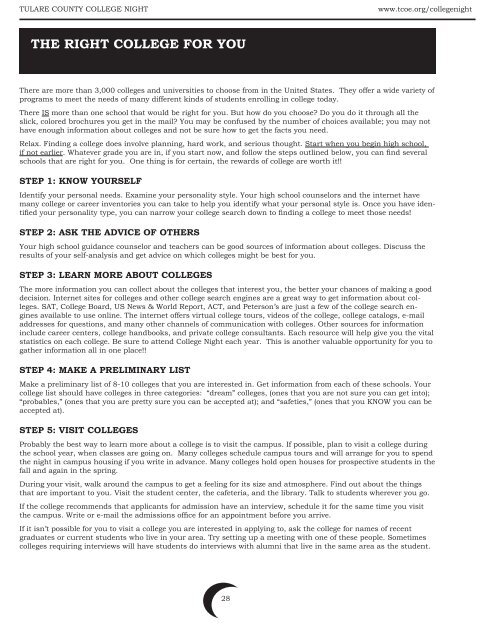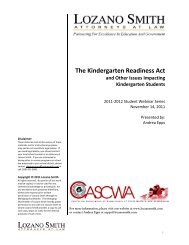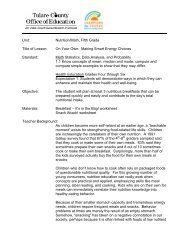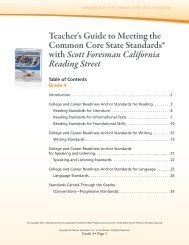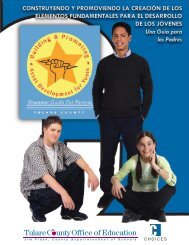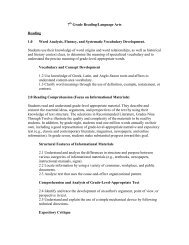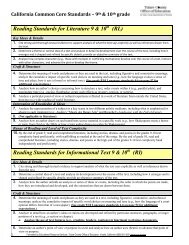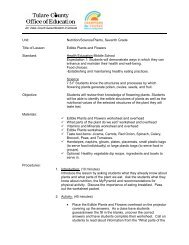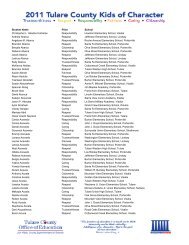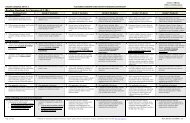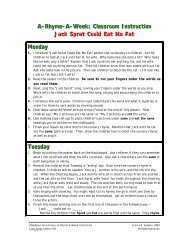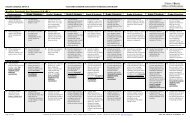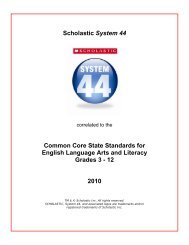2012 college night volunteers - Tulare County Office of Education
2012 college night volunteers - Tulare County Office of Education
2012 college night volunteers - Tulare County Office of Education
- No tags were found...
Create successful ePaper yourself
Turn your PDF publications into a flip-book with our unique Google optimized e-Paper software.
TULARE COUNTY COLLEGE NIGHTwww.tcoe.org/<strong>college</strong><strong>night</strong>THE RIGHT COLLEGE FOR YOUThere are more than 3,000 <strong>college</strong>s and universities to choose from in the United States. They <strong>of</strong>fer a wide variety <strong>of</strong>programs to meet the needs <strong>of</strong> many different kinds <strong>of</strong> students enrolling in <strong>college</strong> today.There IS more than one school that would be right for you. But how do you choose? Do you do it through all theslick, colored brochures you get in the mail? You may be confused by the number <strong>of</strong> choices available; you may nothave enough information about <strong>college</strong>s and not be sure how to get the facts you need.Relax. Finding a <strong>college</strong> does involve planning, hard work, and serious thought. Start when you begin high school,if not earlier. Whatever grade you are in, if you start now, and follow the steps outlined below, you can find severalschools that are right for you. One thing is for certain, the rewards <strong>of</strong> <strong>college</strong> are worth it!!STEP 1: KNOW YOURSELFIdentify your personal needs. Examine your personality style. Your high school counselors and the internet havemany <strong>college</strong> or career inventories you can take to help you identify what your personal style is. Once you have identifiedyour personality type, you can narrow your <strong>college</strong> search down to finding a <strong>college</strong> to meet those needs!STEP 2: ASK THE ADVICE OF OTHERSYour high school guidance counselor and teachers can be good sources <strong>of</strong> information about col leges. Discuss theresults <strong>of</strong> your self-analysis and get advice on which <strong>college</strong>s might be best for you.STEP 3: LEARN MORE ABOUT COLLEGESThe more information you can collect about the <strong>college</strong>s that interest you, the better your chances <strong>of</strong> making a gooddecision. Internet sites for <strong>college</strong>s and other <strong>college</strong> search engines are a great way to get information about <strong>college</strong>s.SAT, College Board, US News & World Report, ACT, and Peterson’s are just a few <strong>of</strong> the <strong>college</strong> search enginesavailable to use online. The internet <strong>of</strong>fers virtual <strong>college</strong> tours, videos <strong>of</strong> the <strong>college</strong>, <strong>college</strong> catalogs, e-mailaddresses for questions, and many other channels <strong>of</strong> communication with <strong>college</strong>s. Other sources for informationinclude career centers, <strong>college</strong> handbooks, and private <strong>college</strong> consultants. Each resource will help give you the vitalstatistics on each <strong>college</strong>. Be sure to attend College Night each year. This is another valuable opportunity for you togather information all in one place!!STEP 4: MAKE A PRELIMINARY LISTMake a preliminary list <strong>of</strong> 8-10 <strong>college</strong>s that you are interested in. Get information from each <strong>of</strong> these schools. Your<strong>college</strong> list should have <strong>college</strong>s in three categories: “dream” <strong>college</strong>s, (ones that you are not sure you can get into);“probables,” (ones that you are pretty sure you can be accepted at); and “safeties,” (ones that you KNOW you can beaccepted at).STEP 5: VISIT COLLEGESProbably the best way to learn more about a <strong>college</strong> is to visit the campus. If possible, plan to visit a <strong>college</strong> duringthe school year, when classes are going on. Many <strong>college</strong>s schedule campus tours and will arrange for you to spendthe <strong>night</strong> in campus housing if you write in advance. Many <strong>college</strong>s hold open houses for prospective students in thefall and again in the spring.During your visit, walk around the campus to get a feeling for its size and atmosphere. Find out about the thingsthat are important to you. Visit the student center, the cafeteria, and the library. Talk to students wherever you go.If the <strong>college</strong> recommends that applicants for admission have an interview, schedule it for the same time you visitthe campus. Write or e-mail the admissions <strong>of</strong>fice for an appointment before you arrive.If it isn’t possible for you to visit a <strong>college</strong> you are interested in applying to, ask the <strong>college</strong> for names <strong>of</strong> recentgraduates or current students who live in your area. Try setting up a meeting with one <strong>of</strong> these people. Sometimes<strong>college</strong>s requiring interviews will have students do interviews with alumni that live in the same area as the student.28


